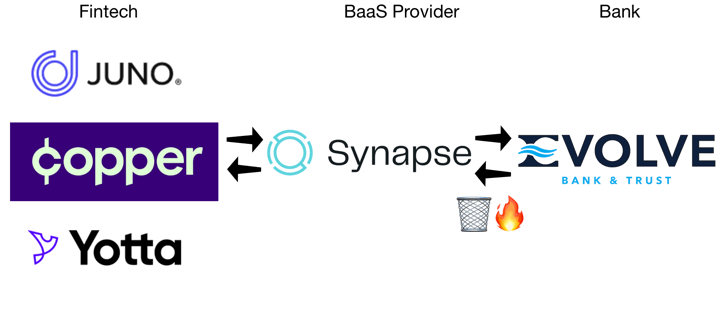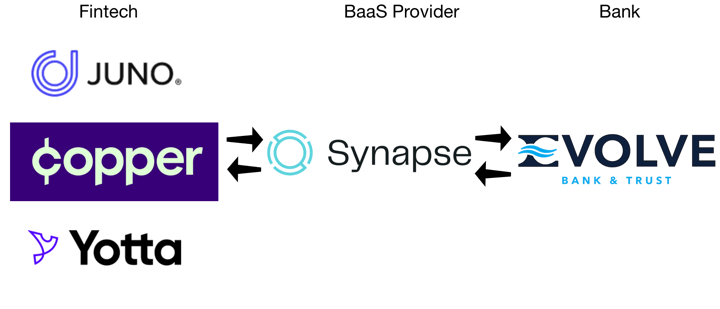Lessons From Juno, Yotta, Copper, Synapse, Evolve Bank Lawsuits — My Money Blog

What happens when the technology behind a Fintech app breaks down? We found out last week, when unfortunately millions of users lost access to their funds (and still haven’t gotten it back as far as I can tell, as of this writing 5pm ET 5/20/24). That’s a week and counting! Spoiler alert: My understanding is it was really the relationships between humans arguing about money that broke down.
A little Fintech background. When you open an account with a Fintech App (financial technology company), you are often presented with some fine print: “*[Fintech App] is not a bank. Banking services provided by [Real Bank], Member FDIC.” What does that mean? It means that the Fintech is charge of managing the customer-facing interactions – a software layer if you will – and the bank provides access to FDIC insurance and the banking transaction infrastructure. The bank usually opens up an “FBO account” for the fintech. Here is a good definition from Treasury Prime:
An FBO Account (For-Benefit-Of Account) is an umbrella fiduciary account that pools various funds “for the benefit of” a number of beneficiaries, such as end-users, without the fintech assuming ownership interest in the accounts. For fintechs that want to control more of the user experience and not leverage pre-defined bank processes, a fintech may choose to open an FBO account instead. […]
The fintech company can open up the FBO account that sits on their partner bank’s core for the benefit of all of its customers, and use it to establish virtual accounts. In this scenario, the fintech’s end customer would have a sub-account (or “ledger” account) that sits within the umbrella FBO account. The fintech can then track these virtual accounts on a ledger with the support of its BaaS provider.
Deposits held by the customer as a beneficiary to the FBO account are FDIC-insured on a pass-through basis to the same extent as if the deposits were made directly, assuming specific requirements are met.
Significantly, the fintech has no ownership interest in the FBO account and has no control over the funds. The bank maintains control over the funds at all times.
In some cases, the bank itself provides and markets this “Banking as a Service” to external fintech companies. In other cases, there are standalone “Banking as a Service” (BaaS) companies that are essentially the middlemen between fintechs and banks. This was the case with Juno, Yotta, and Copper. (I would not open an account with any of these places right now. Read on for the drama.)

I’m not an expert on these matters, but this is my best understanding of what happened:
- Synapse, a BaaS provider, had a dispute over millions in unpaid fees and misappropriated user funds with another fintech, Mercury, and the same Evolve Trust & Bank. (Mercury later went to partner directly with Evolve.) Synapse filed for bankruptcy in 2023. Another company, Tabapay, was in talks to acquire Synapse, but that was announced as cancelled on May 9th, 2024. Synapse blamed Evolve Bank & Trust for not resolving existing issues so that the acquisition could move forward. Another player, Lineage Bank, did payment processing for Synapse and also cut off Synapse on May 9th, 2024. They also still holds millions of user funds in an FBO account.
- On May 11th, 2024, Synapse blocked Evolve from accessing to their “Dashboard” which had the transaction ledger data of every fintech user from Juno, Yotta, and Copper. Since this meant that Evolve Bank & Trust couldn’t verify the reason for money coming in and out of the FBO accounts held at their bank, they completely froze access to those FBO accounts.1 This meant that ACH transfers in and out no longer worked, and debit card transactions also failed.
- Synapse says that they restored this Dashboard access on May 13, 2024.2 Evolve disputes this and says that they have not received adequate settlement and ledger reports.3 Evolve and Synapse continue to argue inside a US bankruptcy court.
- Jason Mikula (Fintech Business Weekly, @mikulaja) has been providing some of the most direct and timely insight on this situation.
- Right now, things are still a dumpster fire. 🗑🔥 The FDIC apparently is not getting involved because this is not a bank failure. The bankruptcy judge is basically looking down at two fighting children and yelling “You two! Sort it out!” Meanwhile, more than entire week has passed and the end customers still haven’t been able to access their funds as this writing 5pm ET 5/20/24.
In the previously-mentioned Treasury Prime article, it goes on to mention the heightened risk of an “intermingled FBO model” setup. I don’t know if this is what Synapse offered, but it does ring several alarms 🚨:
Some BaaS providers offer an intermingled FBO model through bank partnerships. In this particular model, the BaaS provider opens one FBO account for the benefit of all of its fintech end-users across various companies, rather than have each fintech open an FBO account with the partner bank directly.
The level of risk in this arrangement could be profoundly greater than the risk of a traditional FBO account.
[…] Even more concerning to the fintech in this arrangement is the significant ledgering precision and reconciliation required in this model. Any slight ledgering error or calculation gap could require rebalancing and re-ledgering all ledger accounts or sub-accounts in the entire FBO account. This could potentially create a domino effect and impact the records and corresponding funds of a large number of accounts.
The takeaway? Fintechs are still a new form of banking that isn’t well-regulated and things can break. Even though pass-through FDIC insurance applies, I would still never make any fintech my primary day-to-day checking account due to the possibility of short-term loss of access. Now, I’d bet that I am in the top 0.1% of people with the most fintech accounts opened. I’m probably nearing triple digits. I still plan to open new accounts, try out new features, and earn sign-up bonuses and perks. But I always do my due diligence and know that these folks learned from the school of “ask for forgiveness, not permission”. If startups choose to “move fast and break things”, it may take a while to fix them. Not all fintechs are the same, but never put all your eggs in one basket.
I still expect all customer funds to be released eventually, but I know that the lack of liquidity can be very painful for people and that is very unfortunate. It bugs me that you know that the rich CEOs aren’t being forced to negotiate with landlords, credit card companies, medical providers, and so on. Here is a link to file a CFPB complaint.
I don’t plan to do any future business with any of the parties involved. The fintechs themselves seem to have stuck with a bankrupt BaaS provider for several months because they didn’t find a better option (or nobody else wanted to deal with them). Per an email from Juno:
Over the last 6 months we have attempted several times to diversify our banking stack and even spent 3 months of engineering resources to integrate with a new partner. Given that our platform offers crypto adjacent services, it has been incredibly difficult to get a final approval from a bank partner to onboard customers. This is a broader problem specific to the crypto industry due to the current regulatory climate not being favourable to crypto or crypto adjacent companies.
Copper, Juno, and Yotta all neglect to mention this crisis on their front pages. They should be more transparent with their issues. With the public anger growing, Yotta instead went and completely deleted their X/Twitter account. Wow.
1 From TechCrunch:
An Evolve spokesperson confirmed to TechCrunch that on May 11, “Evolve Bank & Trust faced an unexpected challenge when Synapse abruptly and without prior notice disabled our access to an account and transaction information dashboard controlled by Synapse and needed by Evolve. This sudden disruption significantly impacted our ability to maintain the visibility and transparency that Evolve needs to have into accounts and transactions. In response to this situation, Evolve took swift and decisive action to safeguard the security of end user funds and ensure compliance with applicable laws. As a precautionary measure, we made the difficult decision to freeze payment and card activity until we could successfully re-establish access to the dashboard as well as receive necessary account and transaction data and reports. While we understand the inconvenience this may have caused, this step was taken with the utmost consideration for the security and integrity of end user accounts. Evolve continues to work diligently to obtain necessary information from Synapse.”
2 From Medium written by the Synapse founder:
The continuation of the account freeze by Evolve, despite the restoration of Dashboard access on Monday, May 13, 2024, is unsupportable. Freezing the funds has been unnecessary and punitive, causing significant harm to depositors who rely on access to their funds for essential needs.
3 From Forbes:
The hearing brought no end to the dispute that led Evolve to block customer access to funds, after, it says, Synapse cut off its access to a dashboard necessary for the bank to run compliance screens and determine how much money each individual fintech customer actually has in pooled accounts maintained for their benefit. Synapse says that access was restored this past Monday, but Evolve insists it still doesn’t have what it needs.
Barash did what he could to force a resolution. He ordered Synapse to provide settlement and ledger reports that Evolve Chief Technology Officer Christopher Staab testified the bank had not received. He also ordered executive and technical team members from Evolve and Synapse to meet and confer by Monday to discuss how to restore consumers’ access to their funds.



